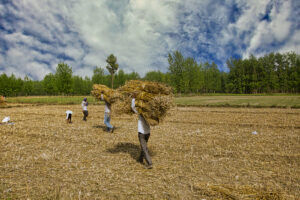The parable of the poor peasant
A poor peasant struggles to carry a bundle of sticks the size of a Volkswagen up a long hill to use for firewood in his village. His body bowed forward under the huge bundle’s weight, his outstretched arms precariously balance the bulky load on his back as he exerts great effort with each careful step in his slow progress up the hill.
An economist trots alongside, circling and peering into the great bundle from various angles, intent on figuring out why the firewood can’t be delivered more efficiently, faster—more profitably—to the village. He frets about how the sticks might be re-bundled so they could be more quickly delivered. He calculates that the bundle might be improved by pulling out this stick from here and re-inserting it over there.
He is a brilliant economist with advanced degrees in stick bundling from the Chicago School, and he’s won many awards—from his peers. He is quite certain he could make the bundle arrive quicker—and make himself look better in his inherited role of advising politicians on how and when to command quicker arrivals—if his complex pseudo-mathematical modeling could but identify a more optimum arrangement for bundling the sticks.
From our superior vantage point, we of course observe that the economist is triply blind—he fails to notice the living peasant struggling beneath his burden, or the peasant’s obvious deficiency of the economic basics every human needs, or that both conditions warrant his own empathy. Not to mention his deficiency of common sense.
Neither human needs nor empathy—nor common sense—received much attention during the economist’s years of exposure to what passes for an education in economics. His training prepared him only for top-down attempts to control large complex economic systems, leaving him totally ignorant that peoples’ simple daily needs are always bottom-up.
